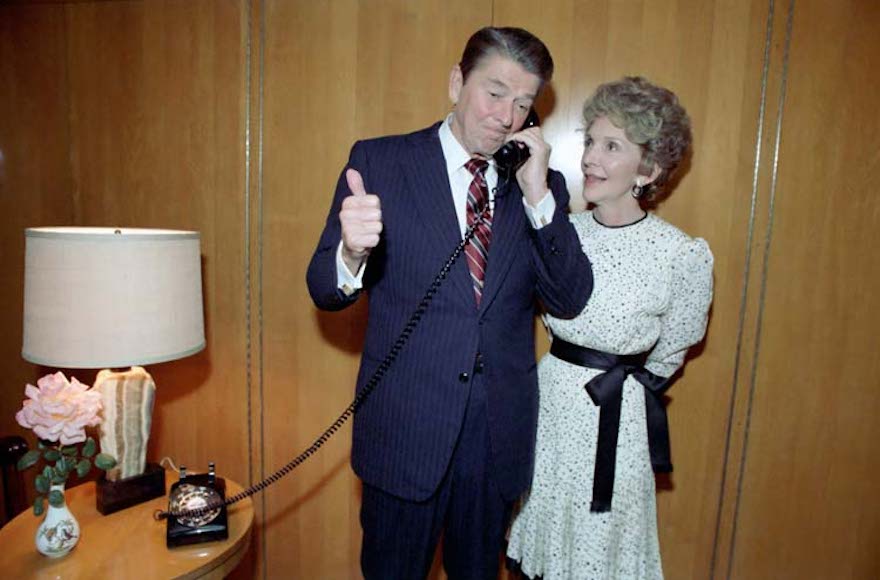President Reagan disassociated himself today from the Ku Klux Klan, declaring that they and other hate groups have no place in American political life. But the U. Commission on Civil Rights called on Reagan to directly repudiate the endorsement of his candidacy by the Ku Klux Klan and for the Rev. Jesse Jackson to reject the support of Black Muslim leader Louis Farrakhan.
The Commission made these statements after its vice chairman, Morris Abram, read a letter from Reagan to him saying the President has “no tolerance for what the Klan represents and would have nothing to do with any group of that type. ”
Abram noted that Mary Berry, a member of the Commission, brought to the attention of the Commission an April 17 news story in which neither White House spokesman Larry Speakes nor the Reagan-Bush re-election committee headquarters would comment on Reagan’s endorsement by Imperial Wizard Bill Wilkinson, leader of the Louisiana based Knights of the Ku Klux Klan. At a Georgia rally April 14, Wilkinson told Klan leaders that the Administration shares some of the same beliefs as the Klan and the Republican Party platform “is pure Klan.”
At the time, Berry said that if Reagan did not comment, she would bring up the issue at today’s meeting. Abram said that he inquired of the White House and received today the President’s letter, dated April 30 from China, where Reagan was on a state visit.
STATEMENT BY REAGAN
Reagan’s letter to Abram said: “While in China, I have been distressed to learn that some individuals back home have questioned whether my views on the Ku Klux Klan have somehow changed since 1980. Nothing could be further from the truth.
“In 1980, I said that I have no tolerance for what the Klan represents and would have nothing to do with any groups of that type. If anything, my feelings on this subject have only grown stronger. The politics of racial hatred and religious bigotry practiced by the Klan and others have no place in this country, and are destructive of the values for which America has always stood. Those of us in public life can only resent the use of our names by those who seek political recognition for the repugnant doctrines of hate they espouse.
“I firmly believe there is no room for partisanship on this question. Democrats and Republicans alike must be resolute in disassociating ourselves from any group or individual whose political philosophy consists only of racial or religious intolerance, whose arguments are supported only by intimidation or threats of violence.
“We must and will, continue our unified rejection of such elements of hate in our political life, for while there are many issues which divide us, it is fundamental principles such as this which will always draw us together.”
‘FLAT-OUT’ REPUDIATION SOUGHT
Berry said that Reagan, by referring to his 1980 statement, did not specifically repudiate the current endorsement by the KKK. She said she would like to see a statement to the Commission rejecting Wilkinson’s endorsement “flat-out.” Abram and the other Commission members agreed. They also agreed that Jackson should repudiate Farrakhan. They said that all candidates should disavow support from individuals who espouse racism, bigotry, intimidation or threats of violence.
Meanwhile, Nathan Perlmutter, national director of the Anti-Defamation League of B’nai B’rith, last week called upon the Republican Party to issue “a prompt and unequivocal repudiation” of the Klan’s endorsement of Reagan.
He said he was distressed by “the unfortunate stalling, buck passing and refusal to comment” by White House aides when asked by reporters whether the President planned to repeat his 1980 renunciation of Klan support.
Perlmutter said “it is a disservice to the President when his aides pussyfoot the issue and, indeed, pay his own statements of record no heed.”
He added: “All candidates for public office, but especially those who aspire to the highest office in the land, must hold themselves to the ethical principles of our democratic heritage as an example and inspiration to their fellow Americans. Whatever else a President may be, he must be a role model.”
JTA has documented Jewish history in real-time for over a century. Keep our journalism strong by joining us in supporting independent, award-winning reporting.
The Archive of the Jewish Telegraphic Agency includes articles published from 1923 to 2008. Archive stories reflect the journalistic standards and practices of the time they were published.




